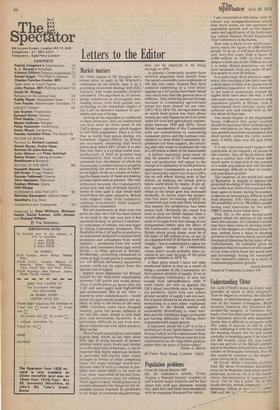Population problems
From Sir David Renton MP Sir: Dr Linklater's article, 'Every Granny a Wanted Granny' touches on half a dozen major subjects and he lays about him with gay abandon, mixing fact, part-fact and total misconception, with an engaging disregard for clarity. I am concerned in this letter, only to correct any misapprehensions which may have arisen on the question of population growth and on the importance and significance of the forthcoming United Nations World Population Year Conference in Bucharest.
Next year is likely to see world population reach the figure of 4,000 million people. To do so, it will have doubled in only forty-five years, from a figure of 2,000 million in 1930. In that time, despite a birth rate in the 1930s as low as it is today, British population too will have increased, from just under 45 million people to over 55 million.
It is quite clear, from previous experience, that reaching a low birth rate for a short space of time, is no guarantee of a stabilized population. In fact, because of the built-in momentum created by higher birth rates since the war, it will take some sixty to seventy years to stop population growth in Britain, even if replacement level fertility rates are achieved now and remain with us for the whole of that time.
The recent Report of the Population Panel, indicated that great caution should be exercised when attempting to draw conclusions on long term population growth rates from examination of a short period, within the cyclic movement of birth rates over the past forty years.
It is my conviction and I suspect the conviction of the majority of people in this country, that all the problems that we as a country face, will be made that much easier to deal with in the context of a stable population and will become increasingly difficult in face of continued population growth.
The countries of the world will meet at Bucharest in August to discuss the projected doubling of the world population in the next thirty-five years and will meet again in Rome, during November, to discuss an increasingly difficult world food situation. FAO forecasts indicate the possibility of over 700 million people facing total starvation by the early 1980s if action is not taken now.
This, Sir, is the grim background against which the nations of the world meet this autumn. Dr Linklater's article may have some value in drawing attention to the dangers of a dictator state. It may, indeed; have a value in drawing attention to the severe moral, social and theological dilemmas facing many of us. Unfortunately, Dr Link later gives no indication that he is aware of the nature of the crisis which faces the world now and increasingly during the remainder of the twentieth century, as a result of continued population growth.
David Renton House of Commons, London SW


































 Previous page
Previous page